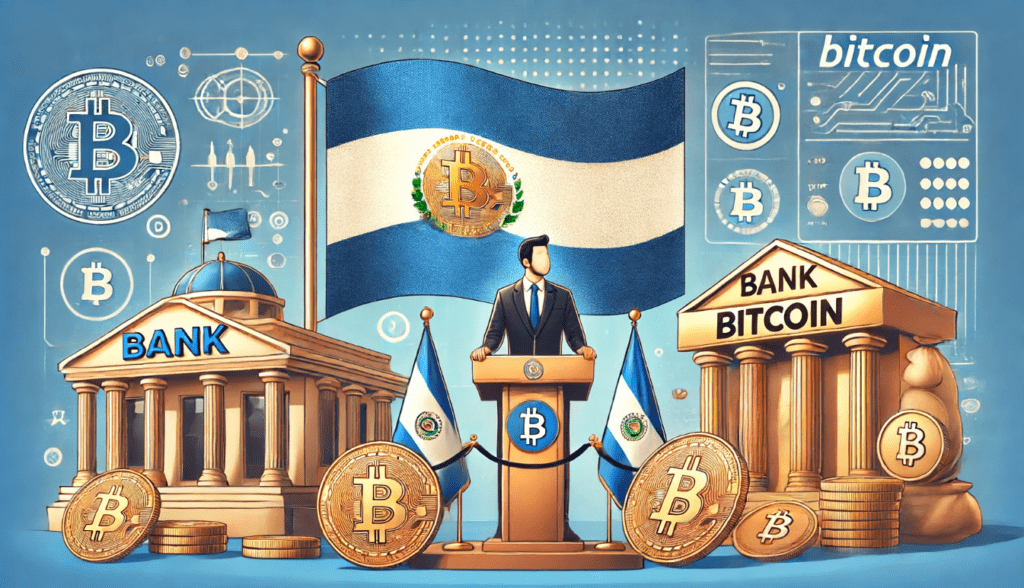Salvadoran President Nayib Bukele has proposed the establishment of a private investment bank that, if approved, would offer Bitcoin investors broader financial services than conventional banks. This proposal comes just two weeks after Bukele was sworn in for his second term following a landslide election win.
Proposal for a Bitcoin Bank
The proposed Bank for Private Investment (BPI) aims to diversify the financing options available to potential investors by offering services in both U.S. dollars and Bitcoin. This innovative approach aligns with Bukele’s vision to integrate Bitcoin more deeply into the country’s financial system.
“As part of our economic plan for El Salvador, we propose a BPI, Bank for Private Investment, where we can diversify the financing options offered to potential investors in dollars and Bitcoin,” wrote Salvadoran Ambassador to the US Milena Mayorga in a post on X.
Max Keiser, a senior Bitcoin adviser to Bukele, expressed his support for the proposal, stating: “President Bukele hits the ground running in new term with new legislation establishing a Bitcoin Bank.”
Background and Challenges
Bukele’s embrace of Bitcoin has been a notable part of his economic strategy since El Salvador became the first country to make it legal tender in 2021. The move was initially met with skepticism both domestically and internationally, with critics highlighting the volatility of Bitcoin and potential risks to the national economy.
Despite these challenges, Bukele has remained steadfast in his commitment to Bitcoin. His administration has launched several initiatives to promote its use, including the development of a nationwide Bitcoin wallet called Chivo, and incentives for businesses to accept Bitcoin as payment.
Bukele’s popularity remains high, largely due to his successful crackdown on the country’s infamous criminal factions, Mara Salvatrucha 13 and Barrio 18. These gangs had held the nation in their grip for decades, contributing to its notoriety as one of the most violent countries in the world. Recent government data, however, shows a dramatic improvement, with El Salvador now having a murder rate on par with Canada.
Economic Implications
The establishment of a Bitcoin bank could have significant implications for El Salvador’s economy. It would provide a broader range of financial services to Bitcoin investors, potentially attracting more foreign investment and boosting economic growth. The bank could also offer new opportunities for Salvadorans to access financial services, especially in a country where a large portion of the population remains unbanked.
However, the proposal also raises questions about regulatory oversight and financial stability. Critics argue that the integration of Bitcoin into the national financial system could expose the economy to increased volatility. There are also concerns about the potential for money laundering and other illicit activities, given the relative anonymity of Bitcoin transactions.
Bukele’s proposal for a Bitcoin bank is still in its early stages, and it remains to be seen whether it will gain the necessary support from lawmakers and regulators. The government will need to address these concerns and ensure that the new institution operates within a robust regulatory framework.
Despite the challenges, Bukele’s bold vision for integrating Bitcoin into El Salvador’s economy has already made history, and the establishment of a Bitcoin bank could further solidify the country’s position as a global leader in cryptocurrency adoption.
International Reactions
The international community has been closely watching El Salvador’s Bitcoin experiment. While some countries and organizations have expressed concerns, others see it as a potential model for integrating cryptocurrencies into national economies. Bukele’s proactive approach could inspire other nations to explore similar initiatives, especially in regions with limited access to traditional banking services.
President Nayib Bukele’s proposal to establish a Bitcoin bank represents a significant step in his ongoing efforts to integrate Bitcoin into El Salvador’s financial system. While the proposal faces challenges and skepticism, it also offers opportunities for innovation and economic growth. As the world watches, El Salvador continues to blaze a trail in the adoption of cryptocurrency, setting the stage for potentially transformative changes in the global financial landscape.












